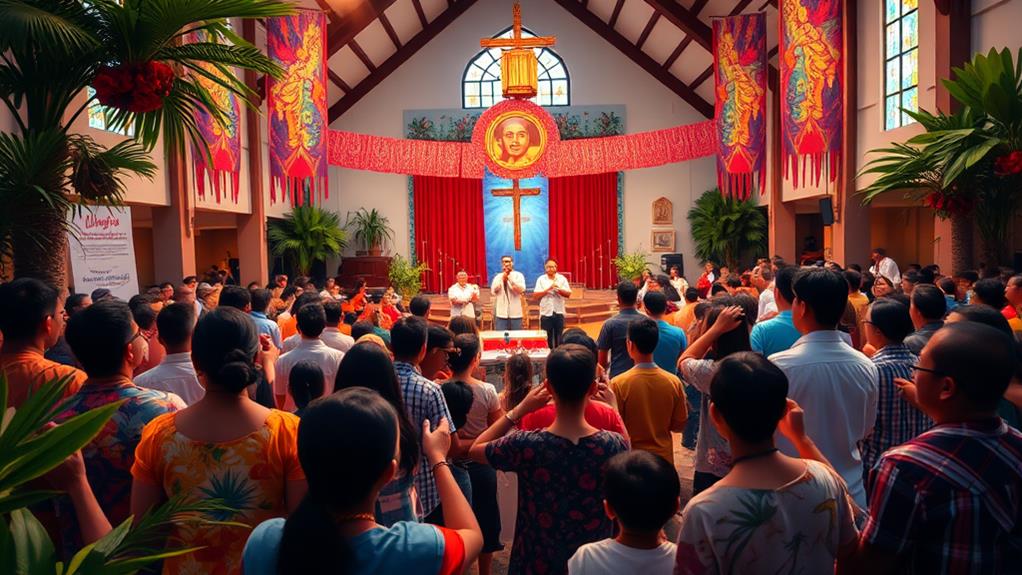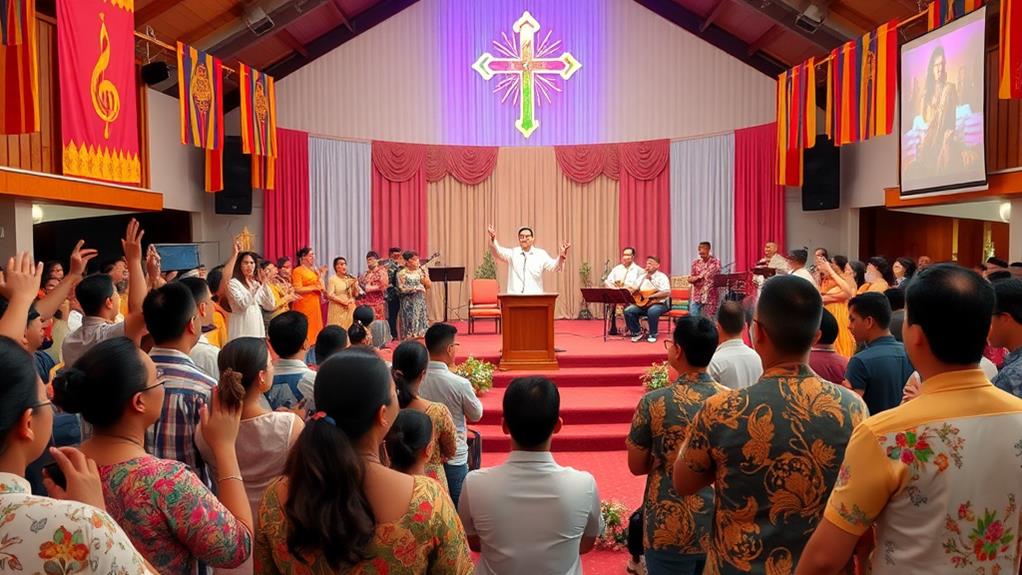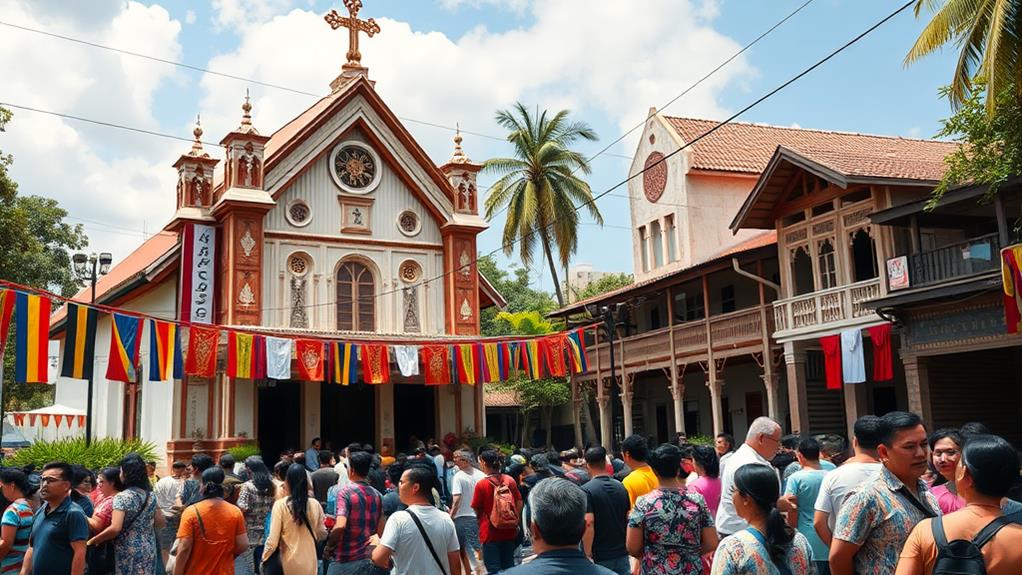Evangelical Christianity has become a significant force in the Philippines, with approximately 2.8% of the population identifying as Evangelicals. This growth is largely attributed to the influence of American colonization, which introduced Protestantism and encouraged religious diversity in the country.
The Philippine Council of Evangelical Churches is a key organization that has unified Evangelical communities, providing a platform for collaboration and coordination.
Despite facing challenges such as minority status and cultural adaptation, Evangelicals in the Philippines are actively engaged in social justice initiatives and community outreach.
For instance, many Evangelical churches have established programs to support marginalized communities, provide disaster relief, and promote education and healthcare.
Their dynamic presence both locally and globally underscores a powerful evolution in Filipino spirituality.
Overview of Evangelicalism

Evangelicalism in the Philippines accounts for a small but distinct 2.8% of the population. Unlike the majority who adhere to Roman Catholicism, Evangelicals have created a unique identity that blends local culture and historical influences.
The arrival of American colonization introduced Protestantism, significantly impacting church practices and beliefs. This American cultural influence is evident in the structured services and the prevalent use of English-language Bibles within Evangelical churches.
Evangelical communities have thrived in areas with high concentrations of overseas Filipino workers (OFWs). For example, in the UAE, four Evangelical churches cater specifically to this demographic, showcasing their adaptability and commitment to serving their community.
The Evangelical Church Diaspora (TECD) extends their influence beyond national borders, illustrating the global reach of Filipino Evangelicals.
Despite being a minority, the growth of Evangelicalism highlights an evolving Christian population in the Philippines. This diverse community includes Indian converts and reflects broader cultural integration within their churches.
Evangelicalism is an important, albeit small, part of the Filipino Christian experience.
Demographics of Filipino Evangelicals
In the Philippines, a predominantly Catholic country, Evangelicals make up a distinct minority, comprising about 2.8% of the overall Christian population. This highlights the significant influence of the Catholic Church, which accounts for 70.9% of the population.
The demographic of Filipino Evangelicals is shaped by several key factors. International expansion has led to the establishment of Evangelical churches abroad, particularly in places like Dubai, due to the migration of Filipinos.
Since 2000, there's been noticeable growth in Evangelical demographics, contributing to a more dynamic religious landscape.
Despite being a minority, Filipino Evangelicals have built diverse communities that reflect both local and global influences.
For example, Evangelical churches have been established in regions with high populations of Overseas Filipino Workers (OFWs).
These trends indicate a growing presence of Evangelical churches in the Philippines, influencing Christianity in the country while maintaining a distinct identity amidst the dominant Catholic culture.
Key Organizations and Churches

Filipino Evangelicals have formed a network of organizations and churches that serve local communities and extend their reach internationally.
The Philippine Council of Evangelical Churches (PCEC) plays a vital role in promoting unity among various evangelical groups and spearheading national evangelization efforts. This collaboration among Evangelical churches enhances their visibility and influence across the nation.
One notable organization is the National Council of Churches in the Philippines (NCCP), established in 1963.
The NCCP engages actively in socio-political discourse, emphasizing the importance of faith in societal issues.
The Evangelical Church Diaspora (TECD) represents a significant expansion of Filipino Evangelical communities abroad.
The TECD has led to the establishment of multiple congregations internationally, catering to the spiritual needs of Filipinos overseas, especially in regions populated by Overseas Filipino Workers (OFWs).
A prominent Protestant movement in the Philippines is the Iglesia ni Cristo.
With nearly two million members, the Iglesia ni Cristo stands out for its strong anti-Catholic stance, further diversifying the landscape of Christian groups in the country.
Collectively, these organizations and churches reflect the dynamic and evolving nature of Evangelical Christianity in the Philippines.
Challenges Faced by Communities
Challenges Faced by Evangelical Communities in the Philippines
Evangelical communities in the Philippines face significant challenges due to their minority status within a predominantly Roman Catholic nation, representing only 2.8% of the Christian population.
Cultural Adaptation Limitations
Filipino Evangelicals establishing churches abroad struggle to adapt to unfamiliar cultural contexts. For instance, they may misunderstand local customs, leading to unintended offense or cultural insensitivity, hindering community engagement and spiritual growth.
Resource Constraints
Evangelical churches encounter significant resource limitations, restricting their growth and outreach efforts. Specifically, they often lack funding, personnel, and infrastructure, making it difficult to establish and sustain churches, particularly in local and diaspora communities.
Religious Discrimination
Evangelical congregations frequently experience religious discrimination in areas where they're a minority or where other dominant religions prevail. This can manifest in social exclusion, hostility, or even violent persecution, further complicating their mission.
Addressing the Challenges
To navigate these challenges, Evangelical communities must prioritize cultural adaptation by conducting thorough cultural research and engaging with local communities to build trust and understanding.
They must also strategically allocate resources to maximize their impact, focusing on sustainable and scalable initiatives. By doing so, Evangelical communities can work toward greater stability and acceptance while maintaining their unique practices and beliefs.
How Has the Rise of Evangelical Christianity Impacted Religious Freedom and Tolerance in the Philippines?
The rise of Evangelical Christianity has brought changes to religious freedom in the Philippines. While it has provided opportunities for more diverse religious expressions, it has also sparked debates on issues such as same-sex marriage and reproductive rights. Ultimately, it has heightened discussions on religious freedom in philippines.
How Has the Rise of Islam in the Philippines Impacted Evangelical Christianity?
The history and diversity of islam in the philippines has had a significant impact on Evangelical Christianity. As Islam continues to grow in the country, it has provided new challenges and opportunities for the spread of Evangelical Christian beliefs. The coexistence of these religions has shaped the cultural and religious landscape of the Philippines.
Historical Context and Influence

The historical context of Evangelical Christianity in the Philippines has significantly shaped the current landscape. The arrival of American Protestant missionaries in the late 19th and early 20th centuries introduced Evangelical Christianity to the Philippines, leaving a lasting impact on religious practices and beliefs. Today, Evangelical Christianity is one of the major denominations in the country, with a significant influence on social and political issues. Its emphasis on personal conversion and evangelism has led to the proliferation of various church movements and the integration of Evangelical beliefs into Filipino culture, including holy week traditions. These traditions, such as processions and reenactments of the crucifixion, serve as important expressions of faith and cultural identity for many Filipinos.
The American colonization period (1898-1946) introduced Protestantism alongside English education, influencing local church practices and fostering historical tensions between American Protestants and the Catholic Church.
The Spanish-American War fueled anti-Catholic sentiments, contributing to this tension.
The establishment of the Philippine Council of Evangelical Churches (PCEC) in 1963 unified Evangelical groups, enhancing their collective impact on national evangelization efforts. This unity enabled Evangelical Churches to provide alternatives to the Catholic Church, addressing social issues and promoting education in marginalized communities.
The interaction of modernist, fundamentalist, and evangelical movements from North America shaped the theological landscape of Filipino Evangelicalism. This blend of influences contributed to a unique identity within the broader Christian community, illustrating Evangelicalism's enduring influence in the Philippines today.
Cultural Integration and Social Issues
Cultural Integration and Social Issues in Filipino Evangelical Communities
Filipino Evangelical communities, particularly those established by Overseas Filipino Workers (OFWs) abroad, face unique challenges in balancing their faith with cultural adaptation. As they navigate diverse cultural landscapes, they must reconcile their religious identity with the social dynamics of their host countries.
Cultural Adaptation
Filipino Evangelicals must adapt their practices to resonate with local customs while preserving their core beliefs. For instance, in countries where Sunday isn't a traditional day of worship, Evangelical churches may need to adjust their service schedules to accommodate local norms.
Social Justice Advocacy
The growing polarization and social issues in the Philippines motivate Evangelical Churches to engage in outreach programs, addressing concerns beyond mere spiritual guidance. This includes initiatives to combat poverty, inequality, and environmental degradation.
Educational Influence
Many local leaders trained in American institutions bring foreign teachings that require careful evaluation within the Filipino cultural context. This ensures that Evangelical teachings remain relevant and effective in addressing the unique needs of Filipino communities.
In conclusion, Filipino Evangelicals must balance their religious identity with the social dynamics of their host countries as they work towards cultural integration.
This ongoing effort reflects a broader commitment to addressing social justice issues while fostering inclusive communities that respect both faith and cultural diversity.
Questions and Answers
How Did Christianity Become Popular in the Philippines?
Christianity's Popularity in the Philippines
Spanish Colonization and Catholicism
Christianity became popular in the Philippines through the arrival of Spanish colonizers in the 16th century. The Spanish brought Catholicism, which rapidly spread and shaped the nation's identity.
For example, the Philippines' first Catholic Mass was held in 1521, and by the 17th century, Catholicism had become the dominant religion.
Religious Diversity and Protestantism
Over time, religious diversity emerged with the introduction of Protestant denominations. Protestant missionaries arrived in the Philippines in the early 20th century, leading to the growth of Protestant churches.
This shift not only impacted social dynamics but also encouraged community engagement and individual faith expressions.
Evolution of Beliefs
Today, the Philippines is a predominantly Christian nation with a unique blend of beliefs. The country's Christian faith continues to evolve, with many Filipinos incorporating indigenous and Catholic traditions into their practices.
This blend of beliefs is a distinctive feature of Philippine Christianity, making it a fascinating aspect of the country's cultural heritage.
What Caused the Rise of Evangelicalism?
The rise of evangelicalism is attributed to a combination of cultural, political, and social factors.
Globalization has played a significant role in spreading evangelical ideas and practices across the globe.
With the increased connectivity and exchange of ideas, evangelical beliefs have resonated with diverse communities worldwide. For instance, the internet and social media have enabled evangelists to reach a broader audience and share their message with people from different cultural backgrounds.
Social movements have also contributed to the growth of evangelicalism.
Many social movements, such as the civil rights movement and the feminist movement, have found a voice in evangelical teachings that emphasize personal empowerment and community support. Evangelical leaders have often been at the forefront of these movements, using their platform to advocate for change and promote social justice.
These factors have created an environment where evangelicalism can thrive, shaping modern religious landscapes and individual identities.
As a result, evangelicalism has become a significant force in contemporary society, influencing politics, culture, and individual beliefs.
How Many Evangelical Christians Are There in the Philippines?
There are approximately 1.1 million Evangelical Christians in the Philippines, making up around 2.8% of the total Christian population. This demographic growth can be attributed to active community engagement and social movements.
For instance, Evangelical churches have been at the forefront of social welfare initiatives, providing aid to underprivileged communities and promoting education.
The cultural impact of Evangelicalism is significant, as it influences the values and norms of its followers. As a result, Evangelical Christians often prioritize values such as compassion, charity, and social justice.
Despite being a minority, the Evangelical community plays a vital role in shaping the broader landscape of Philippine Christianity.
When Did Evangelical Christianity Become Popular?
Evangelical Christianity gained popularity in the early 20th century due to a combination of historical context, cultural shifts, and social movements.
One significant factor was the response to societal needs. As Evangelical groups emerged, they addressed the concerns of their time, attracting followers seeking community and purpose. For example, the Evangelical movement responded to urbanization by creating community programs and social services, which appealed to people migrating from rural areas to cities.
Political changes also played a role. Evangelical Christianity grew as a reaction to the perceived moral decay of the time, with Evangelicals promoting traditional values and morals.
Additionally, the rise of Evangelical Christianity challenged existing traditions, leading to a shift in cultural values and norms.
The convergence of these factors contributed to the rise of Evangelical Christianity as a significant force in society.